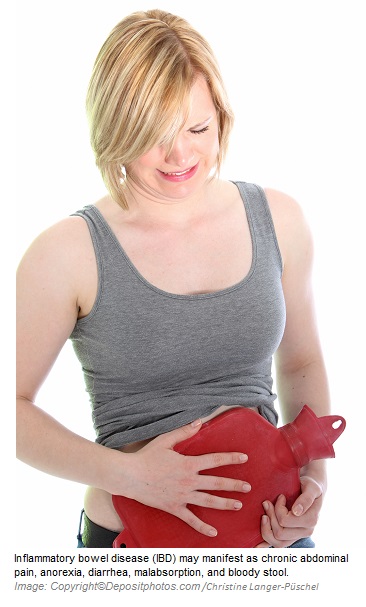 gastrointestinal tract. The two major types of IBD are Crohn`s disease and ulcerative colitis. The incidence of IBD has two peaks: the first peak between 15 and 30 years old, and the second peak between 60 and 80 years old.
gastrointestinal tract. The two major types of IBD are Crohn`s disease and ulcerative colitis. The incidence of IBD has two peaks: the first peak between 15 and 30 years old, and the second peak between 60 and 80 years old.
Crohn`s Disease (CD) can affect any part of the GI system from the mouth to the anus. However, the most commonly involved part of the GI is the terminal section of the small intestine (terminal ilium). It is characterized by chronic abdominal pain at the right lower part, mild fever, abdominal mass, weight loss, diarrhea, anorexia, bloody stool, and malabsorption.
Ulcerative Colitis (UC) usually affects the rectum and extends proximally to involve all or only a part of the colon. It is characterized by bloody diarrhea, crampy abdominal pain, and a sense of incomplete defecation (rectal tenesmus). Fever is not usual.
People with IBD may demonstrate signs and symptoms that are not related to the intestines such as skin changes, and joint, eyes, liver and bile ducts, and urinary tract problems.
Potential contributing factors:
- Genetics.
- Infections.
- Defective immune system.
- Smoking (it may cause Crohn`s disease but has a protective effect against ulcerative colitis).
- Dietary factors.
- Dysbiosis (imbalance in the intestinal flora).
Nutritional Supports:
Restricted Foods:
- Gluten-containing foods: wheat, rye, barley, couscous, spelt, kamut, semolina, triticale, and oats
- Dairy products, especially cow`s milk.
- Foods high in Omega-6 fatty acid: safflower oil, sunflower oil, sesame oil, borage oil, black currant oil, milk, beef fat, corn, avocado, and egg yolk. Omega-6 fatty acid may aggravate inflammation.
- Sugars and sweets.
- Saturated, hydrogenated, and Trans fats.
- Allergenic foods.
- Alcohol.
- Spicy foods.
- Carbonated beverages.
- Food additives, preservatives, and colorings.
Recommended Foods:
- Water: at least 2 liters a day.
- Gluten free foods.
- Whole grains (gluten free).
- Legumes.
- Fresh fruits and vegetables.
- Foods high in flavonoids: berries and grapes.
- Foods high in Omega-3: flaxseeds, chia seeds, hemps, and walnuts.
- Lean protein: fish, turkey, and chicken.
- Pineapple.
- Papaya.
- Fruits and vegetables high in mucilage: jujube, aloe vera, chia seeds, flaxseeds, kelp, marshmallow, okra, and psyllium. Mucilage is a glycoprotein that has healing and anti-inflammatory activities in the gastrointestinal system by covering the mucous membranes and protecting them from getting irritated.
- Chamomile tea.
- Ginger.
- Peppermint tea.
- Green tea.
Recommended Supplements:
- French Maritime Pine Bark Extract: 200 – 300 mg a day. It is a potent antioxidant that has an anti-inflammatory effect.
- Grape Seed Extract: 100 – 200 mg a day.
- Omega – 3 Fatty Acids: 2 – 3 grams a day. It reduces inflammation.
- Licorice in the form of DGL (de-glycyrrhizinated licorice): 200 – 300 mg tablet chewed before each meal and before bed. Licorice alleviates irritation and heals inflammation.
- Aloe Vera Juice: ¼ – ½ cup three times a day. It has soothing and healing effects.
- Digestive Enzymes: A full spectrum product.
- Probiotics: A product that provides minimum 5 to 10 billion organisms per serving.
- Bladderwrack: as a capsule 200 – 600 mg a day, as a tincture 2 – 3 ml a day, or as a tea 1 teaspoon of dried form per one cup of hot water for three times a day. It is a type of seaweed with active ingredients iodine, alginic acid and fucoidan that reduce inflammation.
- Slippery Elm Bark: as a dried form 2 – 4 grams a day, or as a tincture 9 – 12 ml a day. Slippery elm contains mucilage that reduces inflammation and speeds up healing.
- Vitamin D: 2000 – 5000 IU a day.
- DHEA (dehydroepiandrosterone): 25 – 50 mg a day.
- Curcumin: 1000 – 1500 mg a day. It has detoxifying, anti-inflammatory and anti-cancer activities.
- Boswellia Extract: 1200 – 1600 mg a day. The active ingredients in boswellia are volatile oils and boswellic acids that are potent anti-inflammatory agents.
- Glutamine: 3000 – 5000 mg a day. Glutamine is a restorative amino acid that is used by the GI tract for fuel and repair.
- Colostrum: 1000 – 2000 mg a day. It contains immune enhancers and growth factors and helps the GI tract repair damage resulting from diseases and aging.
- Multivitamins – Multiminerals: A high potency product.
Miscellaneous Suggestions:
- Liver detoxification.
- Colon cleansing.
- Aromatherapy with chamomile and lavender.

